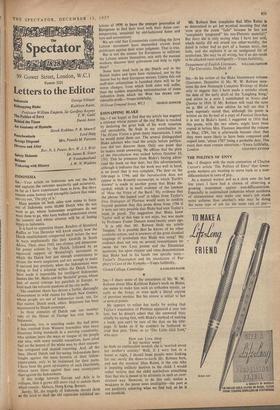share some of the uneasiness of Mr. W. W. Robson
about Miss Kathleen Raine's work on Blake; she seems to make him such an orthodox mystic, as early as the Songs, or even such a literal copyist of previous mystics. But his review is unfair to her at several points.
He appears to refute her easily by saying that Tdylor's translation of Plotinus appeared a year too late, but he doesn't admit that she answered that; chiefly by saying that, with Blake's method of making a book, you can't be sure of the date on his title- page. It looks as if he couldn't be bothered to read that part. Then, as to 'The Little Girl Lost,' who says How can Lyca sleep If her mother weep?
he finds no explanation needed; she is 'worried about her mother's anxiety.' Well, if I were lost in a forest at night, I should hope people were looking for me; surely the down-to-earth Mr. Robson here, and not the mystical Miss Raine, is the one who is imputing unlikely motives to the child. I would rather believe that the child symbolises something than that she is meant to be altruistic in such an over- strained way. However, to do this only makes a weakness in the poem seem intelligible—the poet is not positively admiring what we find bad, so he is not mawkish. Mr. Robson then complains that Miss Raine is so determined to get her mystical meaning that she 'even says the poem "fails" because he has not "completely integrated" his neo-Platonic material!' But there she is only saying what I have just said, which surely did not sound too other-worldly; tho detail is rather bad as part of a human story, she feels, and she explains it as an undigested bit of symbolism. She may be all wrong, but if so she needs to be attacked more intelligently.—Yours faithfully, Department of English Literature, WILLIAM EMPSOM
The University, Sheffield, 10






































 Previous page
Previous page